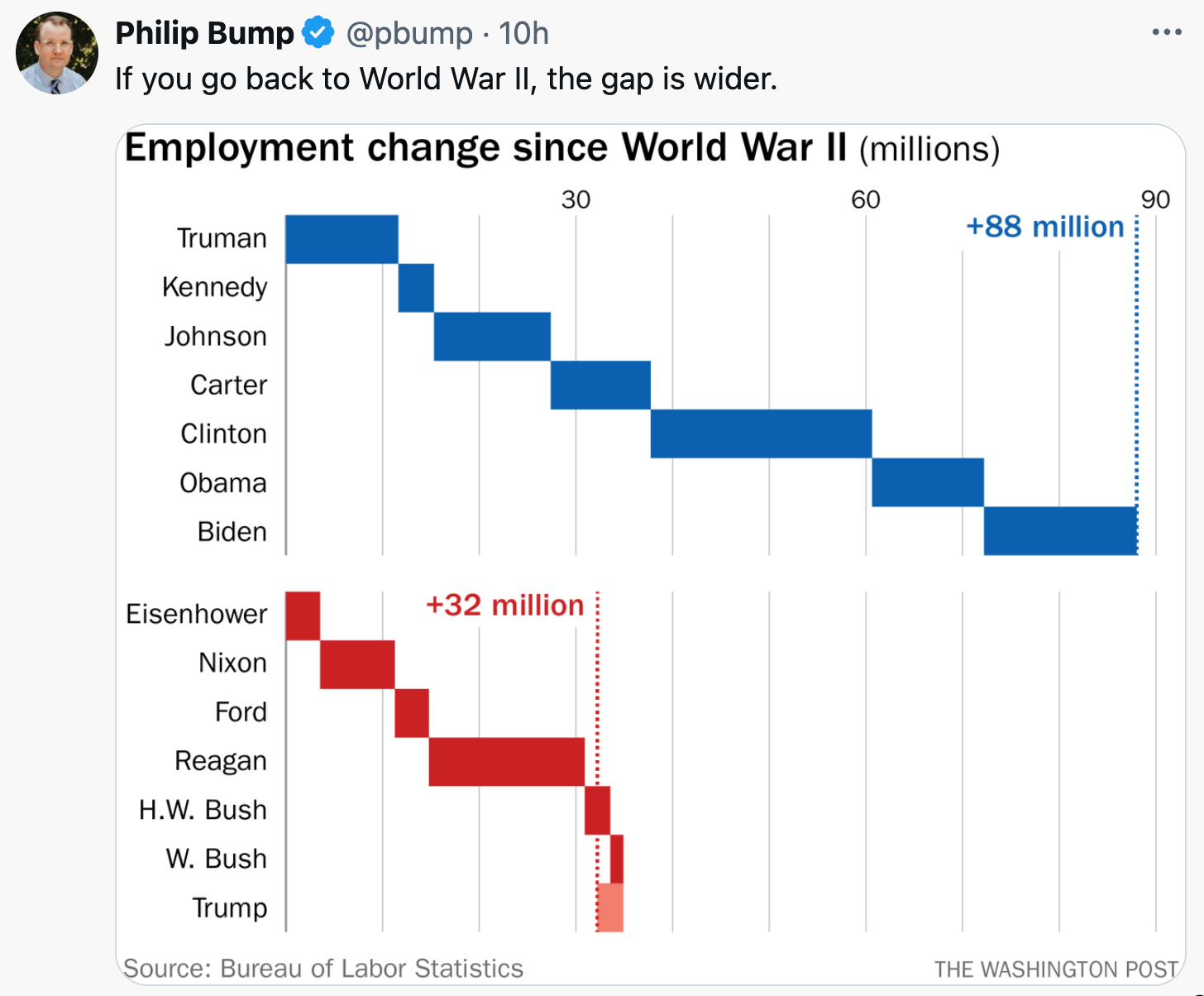WEEKLY BRIEFLY NOTED: FOR 2024-08-23 Fr
My weekly read-around…
ONE IMAGE: The Disjunction Between Economic Performance Under Democratic & Republican Presidents:
ONE AUDIO: Origins of the Federal Reserve as We Know It:
Tim Gwynn Jones & Mark Nelson: Marriner Eccles <https://overcast.fm/+AAx7cuODspU>
ONE VIDEO: Post-Liberal Critiques:
SubStack NOTES:
Very Briefly Noted:
Economics: This, indeed, is the most bizarre thing about the box that the Federal Reserve has managed to climb into and then shut the lid. They will say that it is not that they think that the first rate cut must be followed by subsequent rate cuts with no possibility of extended pauses or reversals. They will say that it is because markets expect that the first rate cut must be followed by subsequent rate cuts with no possibility of extended pauses or reversals. Ask them whether it might be worthwhile using some job owning to break that pattern of market expectations rather than reinforcing it, and they tend to shrug:
Thomas Hutcheson: Jackson Hole Preview: ‘Rate cuts could already have started if the Fed did not act as if the first cut required subsequent cuts with no possibility of extended pauses or reversals… <https://thomaslhutcheson.substack.com/p/jackson-hole-preview>Yes. Not “deglobalization” but managed globalization, with the difference from the years of the neoliberal order of the global value-chains coming in attempts to weaponize interdependence—or deweaponize interdependence, depending on where, when, and how you look at it:
Dan Drezner: How Fragile Is Globalization in 2024?: ‘The open global economy keeps chugging along—for now…. The hard-working staff here at Drezner’s World tends to be more sanguine about globalization persisting despite loud pronouncements that it has come to an end. Great power governments and violent non-state actors have done their darnedest to push the world towards economic segmentation, and it just ain’t happening. Improvements in information and communication technologies have lowered the costs of cross-border flows. Even if states are erecting higher cross-border barriers, that has been counteracted by declining costs more generally… <https://danieldrezner.substack.com/p/how-fragile-is-globalization-in-2024>Only in an economy with a relatively rapidly growing population can you afford to have housing also be a wealth-building asset class, and even then it is far from an ideal way to manage things. That it is seen as such in the current United States is a significant problem:
Noah Smith: Harris has the right idea on housing: ‘It has to be managed as both a consumer good and as an asset class…. These two objectives directly conflict — if owner-occupied housing becomes more affordable, that makes most Americans poorer…. This fact sets up a direct and inevitable conflict between two large classes of American society: homebuyers versus homeowners…. An ideal housing policy has two key characteristics: (a) It consistently creates a lot of new housing supply, and (b) It makes housing wealth appreciate slowly but steadily over time, so that people leave the system richer than they bought in…. There’s a lot we can do to approximate the Singaporean system, or at least move in its general direction. The key “Singaporean-style” approaches would be: (a) Have government increase the supply of housing, through deregulation, construction incentives for cities and private companies, and government housing construction. (b) Give credits to first-time low-income homebuyersAnd this is exactly what Kamala Harris’ housing plan does… <https://www.noahpinion.blog/p/harris-has-the-right-idea-on-housing>
Economic History: The best of the “bureaucratic technocracy as a positive force” papers that I have yet seen:
Abhay Aneja & Guo Xu: Strengthening State Capacity: Civil Service Reform and Public Sector Performance during the Gilded Age: ‘We use newly digitized records from the post office to study the effects of strengthened state capacity between 1875 and 1901. Exploiting the implementation of the Pendleton Act—a landmark statute that shielded bureaucrats from political interference—across US cities over two waves, we find that civil service reform reduced postal delivery errors and increased productivity. These improvements were most pronounced during election years when the reform dampened bureaucratic turnover. We provide suggestive evidence that reformed cities witnessed declining local partisan newspapers. Separating politics from administration, therefore, not only improved state effectiveness but also weakened the role of local politics… <https://www.aeaweb.org/articles?id=10.1257/aer.20230019>Journamalism: They are simply not in the business of “inform our readers about what is important”, Dan. That is just not what they do:
Dan Drezner: An Open Letter to the Editors of the New York Times: ‘You need to get your s**t together…. Nate Cohn… “The [Democratic] party has held power for almost 12 of the last 16 years, and it has exhausted much of its agenda; there aren’t many popular, liberal policies left in the cupboard. As long as voters remain dissatisfied with the status quo and the Democratic nominee, a campaign to defend the system might not be the slam dunk Democrats once thought it was…”. I am not a Democrat…. But I have to ask: how in the name of all that is holy did that tendentious sentence get put into Cohn’s piece?!… Controlling the White House is not the same thing as holding unconstrained power…. Democrats have some agenda items in the cupboard that are pretty popular…. Past Democratic policy initiatives, like the Affordable Care Act, used to be unpopular but have become quite popular…. It’s a horrible, unnecessary, inaccurate sentence…. So what were you thinking when you dropped it in there?… I had a discussion with someone who writes for your paper after Cohn’s piece dropped who mentioned the “same five dinner parties problem” of your editorial staff…. And then you react to the criticism with vindication—that if you’re getting heat from “both sides” then you must be doing something right… <https://danieldrezner.substack.com/p/an-open-letter-to-the-editors-of>War: Bret Devereaux on the instability of the political-military order in “Game of Thrones”, as an annoying example of inadequate world-building:
Bret Devereaux: ‘Perhaps the most amusing thing to me in this thread is the folks trying to defend the books by insisting that the Nights Watch wouldn’t ever march south because they’d surely lose. But this sort of thing happens all the time and the highly cohesive standing army often wins! he 4th Crusade went rogue & sacked Constantinople in 1204. Great Catalan Company turned on the Byzantines in the ‘Catalan Revenge’ of 1305. Teutonic Knights spent the 1400s attacking fellow Christians. The Army of Flanders famously sacked Antwerp over arrears in pay in 1576. Hell, a group of Russian mercenaries mutinied and marched on the capital ::checks notes:: in June of last year. You cannot simply assume the loyalty of large bodies of armed men - something needs to hold them to the frontier or they will march the other way!…Public Reason: Very, very smart. But this is a functionalist explanation of why bespoke realities persist, not of how they are created. We need both. I do not think we really have the second yet:
Dan Williams: The social construction of bespoke realities: ‘Self-deception often depends on epistemic teamwork…. Rather than failed attempts at understanding, these beliefs seem more like active attempts at non-understanding…. Weird beliefs are, in some sense, not a mistake… [but] emerge from deep human drives, motives, and interests… not because we cannot figure out the truth but because we do not want to…. bespoke realities, reflections of inner desires rather than symptoms of cognitive dysfunction…. Humans’ most fundamental challenge is cooperation…. Religion is… a cooperative technology created, communicated, and refined by ultra-social animals… to… serve propagandistic and signalling functions…. The most spectacular and consequential forms of self-deception—the extraordinary popular delusions and madness of crowds—result from extensive epistemic teamwork… <https://www.conspicuouscognition.com/p/the-social-construction-of-bespoke>Neofascism: This book is by the chief architect of Project 2025. The people who work on it are solidly in the core of TrumpWorld, and continue to tell people as often as they dare that Trump is 100% behind them, and endorses them:
Colin Dickey: Voters Have a Right to Know What Kevin Roberts’s Disturbing Book Says: ‘J.D. Vance wrote the foreword…. The rest of the book outlines an even more troubling vision…. Kevin Roberts… Dawn’s Early Light… a familiar conservative story…. America is in decline… due to “pantsuited girlboss advertising executives, Skittle-haired they/them activists, soy-faced pajama-clad work-from-home HR apparatchiks, Adderall-addicted dog mom diversity consultants, nasally voiced Ivy League regulatory lawyers, obese George Soros-funded police abolitionist district attorneys, hipster trust fund socialists”… the “least impressive people in the history of the world,” though it’s actually not their fault; they are all secretly controlled by what Roberts calls the “Uniparty”… a loose, fungible cabal of neoliberals, corporate bureaucrats, hedge-fund managers, public school unions, antifa activists, and George Soros… <https://newrepublic.com/article/184651/voters-right-know-kevin-robertss-disturbing-book-says-j-d-vance-project-2025>MAMLMs: A nice review of most of what GPT LLMs are currently and potentially good for—as very quirky interfaces into the anthology-intelligence library that is past human literate observation and creation:
Dan Shipper: What Can Language Models Actually Do?: ‘Compression: They compress a big prompt into a short response. Expansion: They expand a short prompt into a long response. Translation: They convert a prompt in one form into a response in another form…. Remixing: They mix two or more texts (or learned representations of texts) together and interpolate between them…. Compressors… across an arbitrary number of dimensions or requirements… needle-in-the-haystack… find the answer to a difficult question in a long piece of text.… Language models are cultural technologies… give us the best of what humanity knows about any topic…. This is a superpower for creatives: Knowledge can make its way to you—wherever you are, whenever you need it, compressed in just the right format for you to use. What do you want to make with it?… <https://every.to/chain-of-thought/what-can-language-models-actually-do>Infotech: User interface design and user experience is really important!:
Ade: (2019): The U.S. Navy’s $100 Million Checkbox: ‘How Bad Design Killed 10 Sailors and Wrecked a Destroyer…. Two years ago a Navy destroyer was ripped open by the nose of a Liberian tanker. Ten sailors were crushed or drowned as their sleeping quarters filled with water after the collision.At the heart of the tragedy is a single checkbox on a touchscreen. This is the untold story of how bad design caused a crew to lose control of the $1.8 billion John S McCain destroyer and the mystery around how designers manage to avoid blame…. Sitting below these controls is our $100 million checkbox…. The moment this box became unchecked confusion began to spread through the bridge. The crew believed they had lost control of the ship because they were relying on the… rudder, without realizing that the… [left and right] propellors set at different speeds…. The National Transportation Safety Board (NTSB) released a report detailing the findings of their investigation. Conspicuously absent from their recommendations was any discussion about user interface design… <https://adrian3.com/blog/2019/2019-09-28-The-US-Navys-100-million-dollar-checkbox.php>


